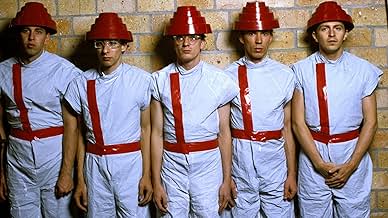En 1980, la banda de new wave Devo logró un éxito con "Whip It" y alcanzó reconocimiento popular con su mensaje de "des-evolución" social, formado en respuesta a los tiroteos de Kent State d... Leer todoEn 1980, la banda de new wave Devo logró un éxito con "Whip It" y alcanzó reconocimiento popular con su mensaje de "des-evolución" social, formado en respuesta a los tiroteos de Kent State de 1970.En 1980, la banda de new wave Devo logró un éxito con "Whip It" y alcanzó reconocimiento popular con su mensaje de "des-evolución" social, formado en respuesta a los tiroteos de Kent State de 1970.
- Premios
- 1 premio ganado y 1 nominación en total
- Self - Devo
- (as Jerry Casale)
- Self - Devo
- (as Bob Mothersbaugh)
- Self - Devo
- (material de archivo)
- (voz)
- Self - Devo
- (material de archivo)
- Self - Devo
- (material de archivo)
- (voz)
- Self - Devo's Manager
- (material de archivo)
- Self - 35th President of the United States
- (material de archivo)
- Self - 37th President of the United States
- (material de archivo)
- Self - 39th President of the United States
- (material de archivo)
- Self - 40th President of the United States
- (material de archivo)
- Self - Killed at Kent State Anti-War Protest
- (material de archivo)
- Self - Killed at Kent State Anti-War Protest
- (material de archivo)
- Self - Early Collaborator
- (material de archivo)
- (voz)
- Self - Christian Evangelist
- (material de archivo)
- Self - Singer-Songwriter
- (material de archivo)
- Self - Entrepreneur
- (material de archivo)
Opiniones destacadas
I was unaware they were actually highly intelligent people trying to give a message politically to us all!!
So many people who were influenced by them and inspired by their music being it controversial mongoloid etc. Didn't know David Bowie had anything to do with them either.
I thought so many of their songs were great and real catchy and still get a buzz out of hearing them. Also now know why MTV do not play their music (didn't in the 80's) and haven't seen them since so that goes to show Sadly 2 of the four have died at a fairly youngish age but the 2 telling the story are fascinating to listen you.
Devo's catalog is rich and tuneful, despite the surface weirdness. The band wasn't just keenly talented musically, they brought a wit and an intellectual heft that was sorely needed in the music industry.
Casale seems to be the genius behind it all with Mothersbaugh right up there. But it's Casale's and Motherbaugh's never-ending complaining about the commercialization of the music industry and how Devo were poor, innocent lambs, victims of not just the piranha-like music industry but of America itself that disappointed me.
It's obvious Devo were masters at commercializing their product, even placing marketing/product paraphernalia inside albums. Instead of being the victims of commercialization, Devo were experts at sucking out the money from everything they touched/touch.
Funny that they whine so much while both Casale and Mothersbaugh continue to become richer and richer in the film industry while the legend of Devo continues to grow.
A fine documentary, as enjoyable as the band, but Devo sometimes come across today as too 21st century, too privileged and entitled with wealth, reminding one of Trump or Musk, playing the victim while enriching themselves.
The story is mostly told by leading band members Mark Mothersbaugh and Gerald Casale. A lot of stuff they talk about would be known to Devo fans, maybe some stories were new or defined better. They talk about their evolution from art students to bumbling musicians and how they came up with the raw Devo concept.
Right from the start Devo were very cynical and frustrated with the world, and stayed that way throughout their Devo journey. I'm not sure if they ever really thought they would alert the world and change it for the better. They take you through their clumsy early years as a band during the early to mid 1970's playing in small clubs and getting booed. Then in 1978 they gain a huge audience by playing on a TV show. A couple of years later Devo peaked with their hit song Whip it, and with some frustration they slowly faded away. Devo were innovative and excellent musicians tight and sharp, but the documentary doesn't give too much credit to this.
Once again, the documentary confirms that it is very difficult to put Devo into a musical genre, they just don't really fit anywhere. Once you see this documentary you might understand why. If you were/are a fan of Devo you should enjoy this. If you don't know or understand what Devo was all about, this might confuse you more!
As a teenager, I first heard Devo's music in 1978. I didn't know what I was listening to, but I liked it. I was drifting away from pop music and needed something else. Devo was a total different world of music. Tell people you liked Devo and most people would roll their eyes.
¿Sabías que…?
- TriviaDevo (via Mark Mothersbaugh) earns approximately $1 million annually from "Uncontrollable Urge," thanks to its long-standing role as the theme for MTV's "Ridiculousness."
- Citas
Mark Mothersbaugh: And after the set was over, Bowie came backstage, and he said he'd like to produce us. We're like, "Sounds good to us, because we're sleeping in an Econoline van tonight."
- ConexionesFeatures Island of Lost Souls (1932)
- Bandas sonoras(I Can't Get No) Satisfaction
Performed by Devo
Selecciones populares
Detalles
- Tiempo de ejecución
- 1h 34min(94 min)
- Color








































